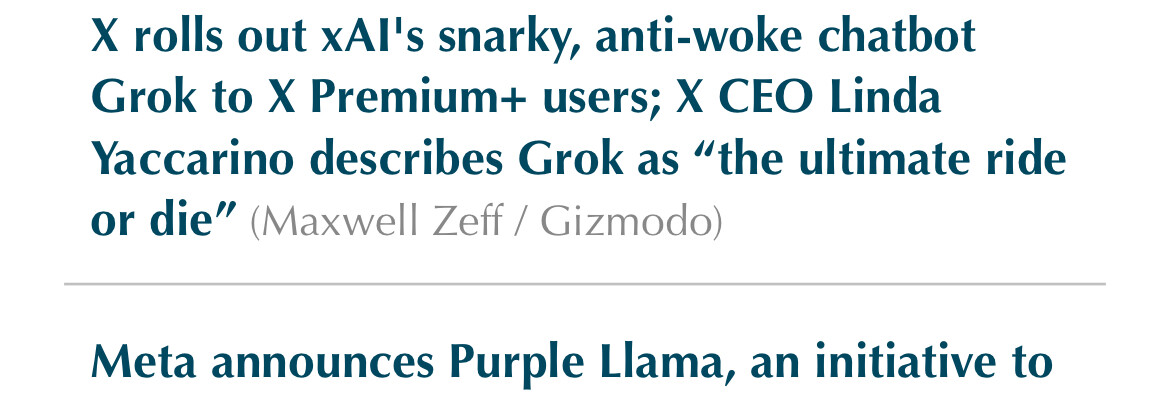Kind likes
Liked
James Cridland (@james@bne.social)

Post details
Attached: 1 image Story 2 in Podnews. I'm clearly not suggesting that the man is making profit by sacking hundreds of people three weeks before Christmas. But you could hold that opinion if you wanted to.

Liked
VM (Vicky) Brasseur (@vmbrasseur@social.vmbrasseur.com)
Post details
Someone keeps emptying the teapot and then not refilling it. 🫖 I would like to speak with a manager. I’m very disappointed in the service in this establishment. #WFH
Liked
Mallory :v_trans: :v_lesbian: (@malcircuit@thingy.social)
Post details
I'm anti-war because the more I learn about history, the more it's clear that wars have a legacy that extends for decades or centuries beyond when they officially end. And I don't mean only the lives lost. The propaganda drives people insane and clouds their vision for decades. All of the things people "had" to do to "win" end up bringing about unintended and unanticipated consequences that never really disappear from society. The madness incites more madness.
Liked
jenn schiffer (@jenn@pixel.kitchen)

Post details
Attached: 1 image just read all these words out loud and now my body is floating and glowing
Liked
Lockdownyourlife (@Lockdownyourlife@infosec.exchange)
Post details
Some of y'all want the humiliation experience for free. I charge for that. #morning #coffee #holidays #nsfw
Liked
Anthony, of course (@anthony@bitbang.social)

Post details
If you use #Patreon to support a YouTube creator, change your name to something funny. They have a tendency to just copy and paste your name into the credits. I've been having so much fun for the last month or so 😂
Liked
kf (@kf@666.glitchwit.ch)
Post details
told my manager I needed to take a half day for my knee again making conversation, she said she didn’t realize it was that bad and asked what kind of accident I got into “my 30s. the traumatic event was entering my 30s.” 😂🫠
Liked
Random Geek (@randomgeek@hackers.town)
Post details
No agenda no meeting. "It's a work party." And? If it needs the company outlook calendar it needs an agenda.
Liked
Scott Hanselman 👸🏽🐝🌮 (@shanselman@hachyderm.io)
Post details
There are no "tech demo gods." There is only prepared or not prepared. #DevRel
Liked
Random Geek (@randomgeek@hackers.town)
Post details
If someone you know wants to share a thread from Twitter in their blog post, remind them that only the first tweet is free nowadays. Seeing the rest of the thread — or even that there is a thread instead of a weird context-free opening tweet — requires a login.
Liked
lady deathbird (@esvrld@octodon.social)
Post details
having a job is like being married except my employer actually fucks me ayyyooo
Liked
Chris Pirillo (@ChrisPirillo@mastodon.social)

Post details
Attached: 1 image one does not simply

Liked
GitHub - fzakaria/sqlelf: Explore ELF objects through the power of SQL

Post details
Explore ELF objects through the power of SQL. Contribute to fzakaria/sqlelf development by creating an account on GitHub.
Liked
GitHub - badboy/sqlelf: Explore ELF objects through the power of SQL

Post details
Explore ELF objects through the power of SQL. Contribute to badboy/sqlelf development by creating an account on GitHub.
Liked
Dare Obasanjo (@carnage4life@mas.to)

Post details
Attached: 1 image Hearing a snippet of a song on TikTok then listening to the entire song on Spotify.

Liked
Amy Hupe (@Amy_Hupe@social.design.systems)
Post details
I wrote something for one of my most favourite writing projects. Like all my writing lately, it’s not the cheeriest piece. But it does have a better end. https://www.ithoughtaboutthatalot.com/2023/wicked-step-mother
Liked
jalciné (@jalcine@todon.eu)
Post details
I was talking to some folks who had to talk me off the idea of a hiring blacklist. It's not like there's been a complete wall: warm referrals still make it. But cold applications? I might as well have a name on some nginx bad bot list with the turn around time for rejections. And I wasn't the only one (similarly aged folks with more contracting backgrounds, different ethnic and national backgrounds) feeling it. It doesn't shake off the sharpness of the lack of income nor the numbness of feeling more than incapable of taking care of oneself. Like I'm more scared than I expected of catching COVID or having some life event that I can't even begin to afford. If employment is so tied to one's ability to take care of themselves, how are we not all living in a feudal state? The social net is of different sizes - if it exists where you live - Florida's unemployment services (aka reemployment support, their words) do more to drill and shame than to support and direct.
Liked
Charles U. Farley (@freakazoid@retro.social)
Post details
Whoever came up with the idea to add "-cli" on the end of command line tools needs to die in a fire. "huggingface-cli" is the worst command name I've ever seen.
Liked
jalciné (@jalcine@todon.eu)
Post details
Oh this is why people were talking about morality and tech, lol https://www.theregister.com/2023/12/08/hashicorp_openbao_fork/ Tbh lol, y'all might not like this, but it doesn't fucking matter. If the fork's not community-run, it's nothing more than a "revenue measuring" contest between two tech CEOs over adoption (because big adopters acquire a lot and accelerate adoption - look at the virus of VS Code despite the vacuum of desktop alternatives people don't have to mention in their dotfiles). The Linux Foundation has (more or less) transformed into the perfect example of Commercial Open Source (open for you, plenty of funds for me but not non-corporate maintainers hahaha sike) extension of Microsoft (personal viewpoint) so even them taking in Terraform will be icky. But then again, it's not like we got coops fabricating chips so it's the best we fucking got.
Liked
Amy Hupe (@Amy_Hupe@social.design.systems)
Post details
People who’ve been through the end of a marriage and feel comfortable sharing, publicly or privately, what helped you? Did life just feel like a relentless firehose of shit for a while after? Really needing an injection of hope right now.
Liked
Luna, but on a new instance (@luna@pony.social)
Post details
The official #GameAwards stream on YouTube, including the pre-show, is 3 hours and 37 minutes long. The trailers total ONE HOUR AND FORTY-FIVE MINUTES. The award acceptance speeches meanwhile, including the few in the pre-show, total just TWELVE MINUTES. Fuck that.
Liked
Anders Eknert (@anderseknert@hachyderm.io)

Post details
Attached: 1 image In case you didn’t know, this is how you wait for popcorn to pop, and any other way is wrong.

Liked
GitHub - guacsec/guac: GUAC aggregates software security metadata into a high fidelity graph database.

Post details
GUAC aggregates software security metadata into a high fidelity graph database. - GitHub - guacsec/guac: GUAC aggregates software security metadata into a high fidelity graph database.
Liked
Marcus Noble (@Marcus@k8s.social)
Post details
I’m now AFK for the next month! 🎉 I’m planning to do some much needed resting and eating my weight in yummy Christmas food.
Liked
mnl mnl mnl mnl mnl (@mnl@hachyderm.io)
Post details
After this codeforward conference and govai which was running at the same time, I got a better sense of the wild amount of fomo and hype and llms being pushed on teams without having real agency, and I get the anti-llms reaction by developers a bit more. Also realized, through my new found lenses, how political software development is in companies (which I traumatizingly didn’t realize before), and damn am I glad to not be in this rat race. #llms 1/
Liked
james (@james@strangeobject.space)
Post details
To learn python, I might write a bot to post “The UK Government is a fascist government” once a day.
Liked
Anders Eknert (@anderseknert@hachyderm.io)
Post details
Wrote a new little tool to help determine the minimum OPA version needed to evaluate any provided Rego files. Published today as #mcov. I know *I* will use it extensively, but if it's helpful to anyone else, all the better. On that and some other projects I'm involved in my new "December hacks" blog. https://www.eknert.com/blog/december-hacks
Liked
nixCraft 🐧 (@nixCraft@mastodon.social)

Post details
Attached: 1 image Piece of art?

Liked
Patricia Aas (@Patricia@vivaldi.net)
Post details
Measuring work linearly in hours makes no sense. I get progressively more useless the more hours I work. Those last hours are just really expensive theater that actually hurts people. Makes no sense.
Liked
james (@james@strangeobject.space)
Post details
Autism: I must eat breakfast at 9am ADHD: oops forgot Autism: that’s okay, we usually have our first meal of the day at lunch, 12pm on the dot ADHD: I see your “12pm” and raise you “17.56pm” Autism: I fucking hate you
Liked
Sophie (@sophie@social.lol)

Post details
Attached: 1 image it's time for the annual festive Slack profile pic, so I've gone as hard as usual this year

Liked
GitHub - cweill/gotests: Automatically generate Go test boilerplate from your source code.

Post details
Automatically generate Go test boilerplate from your source code. - GitHub - cweill/gotests: Automatically generate Go test boilerplate from your source code.
Liked
Gordon Freeman at the Olympic Games · Luna’s Blog

Post details

Liked
David G. Simmons (@davidgs@tty0.social)
Post details
This time I do know who needs to hear this: Explicitly put your compensation range in the job description/listing. It saves everyone a lot of time. Oh, you're willing to go above that for the 'right' candidate? Then just say that too.
Liked
gavi (@gavi@wandering.shop)
Post details
repost this if trans people are safe shoplifting from hobby lobby in front of you
Liked
james (@james@strangeobject.space)
Post details
Okay assessment done I am fucking EXHAUSTED!!!! He says I get no autism points for my emotive facial expressions and gesticulation (I’m the human emoji after all) but whilst not giving me a definitive diagnosis and I have to wait a week he says there are several areas that speak to an ADS diagnosis Probably the fact I spent the entire two and a half hours staring outside the window whilst waxing lyrical about “I don’t know” or when asked to define specific emotions or “happiness is a lack of sadness I guess?” and “no I find most people irritating” and “I don’t really feel anything at all” when asked to talk about family stuff And I’m going to send him my report from my private assessor :) So fingers crossed I get declared autism Started to shut down at the end so glad that’s over
Liked
james (@james@strangeobject.space)
Post details
THEYRE ONE MINUTE LATE THIS IS A TEST They’re obviously not autistic
Liked
james (@james@strangeobject.space)
Post details
I know I am otherthinking this Probably because of my Awk-tism
